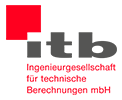For more than 25 years, we have been accepting teaching assignments on the application of the finite elements method for structural mechanics, from 1995 to 2009 at the University of Wuppertal, and since 2009 in the Master’s programme “Product Development and Simulation” in the Faculty of Mechanical Engineering at the Dortmund University of Applied Sciences and Arts. There we teach the module “Structural mechanics (FEM)”.
The theoretical and practical principles of the finite element method are explained to the students in a lecture with integrated practical exercises, and they are taught to independently perform different numerical calculations on the basis of practical examples.
The focal topics include:
- Linear and non-linear calculations (contact definitions, non-linear material behaviour, theory 2nd and 3rd order)
- Dynamic simulations (modal analysis, harmonic and transient calculations, …)
- Introduction to operational stability
- Thermal calculations
- Submodeling technology and APDL programming
Thanks to the close link between experience reports, practical examples from industry and the latest findings from science, the students are thus offered the ideal basis for a successful progression into employment.
Further information:
- Master’s degree
- Youtube video Master in Mechanical Engineering at Dortmund University
- You can find an overview of the final theses prepared in our company here (PDF)

